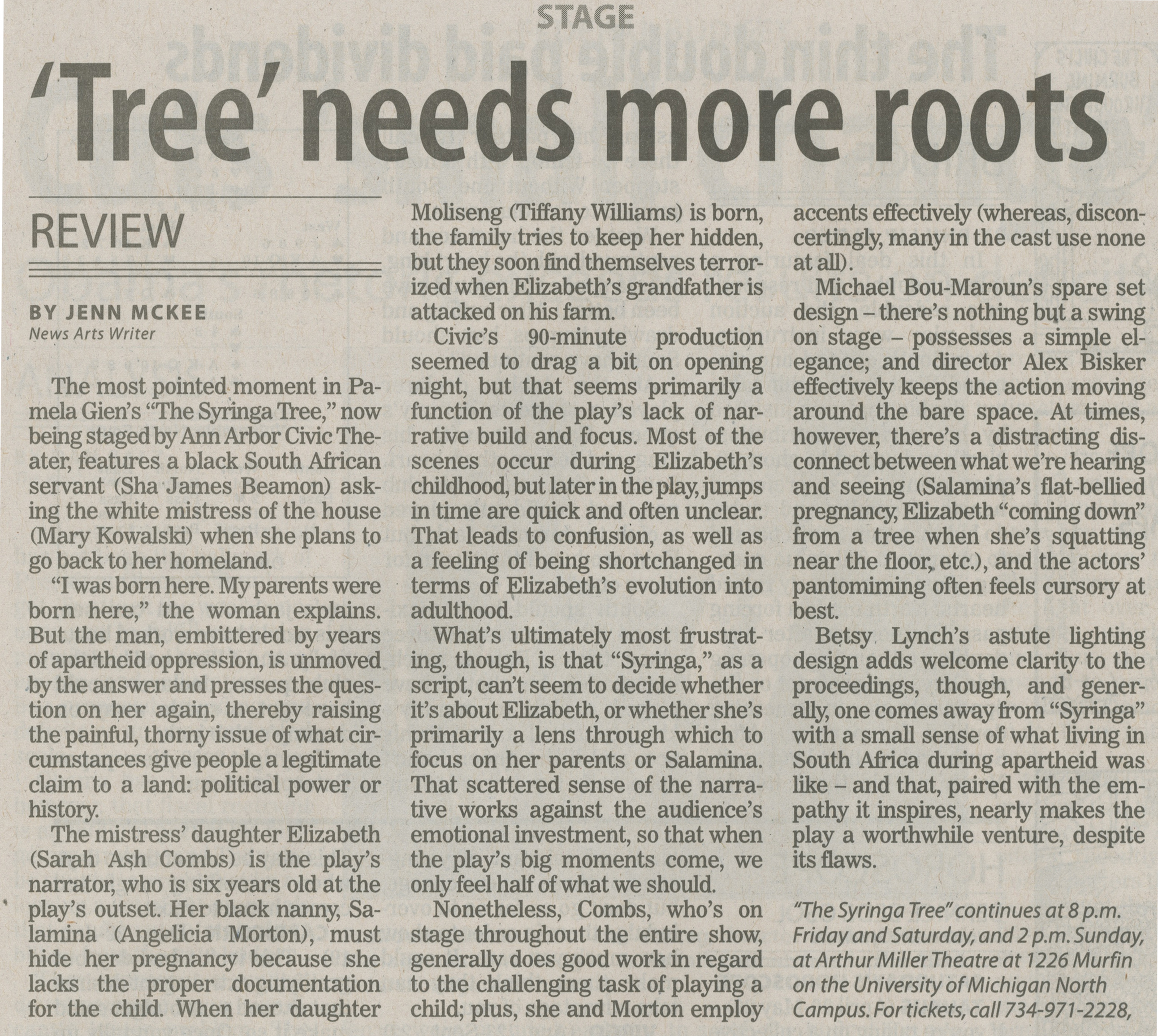'Tree' Needs More Roots

STAGE<br><br>Tree7 needs more roots<br><br>REVIEW<br><br>BY JENN MCKEE<br><br>News Arts Writer<br><br>The most pointed moment in Pamela Gien’s “The Syringa Tree,” now being staged by Ann Arbor Civic Theater, features a black South African servant (Sha James Beamon) asking the white mistress of the house (Mary Kowalski) when she plans to go back to her homeland.<br><br>“I was bom here. My parents were bom here,” the woman explains. But the man, embittered by years of apartheid oppression, is unmoved by the answer and presses the question on her again, thereby raising the painful, thorny issue of what circumstances give people a legitimate claim to a land: political power or history.<br><br>The mistress’ daughter Elizabeth (Sarah Ash Combs) is the play’s narrator, who is six years old at the play’s outset. Her black nanny, Sa-lamina (Angelicia Morton), must hide her pregnancy because she lacks the proper documentation for the child. When her daughter<br><br>Moliseng (Tiffany Williams) is bom, the family tries to keep her hidden, but they soon find themselves terrorized when Elizabeth’s grandfather is attacked on his farm.<br><br>Civic’s 90-minute production seemed to drag a bit on opening night, but that seems primarily a function of the play’s lack of narrative build and focus. Most of the scenes occur during Elizabeth’s childhood, but later in the play, jumps in time are quick and often unclear. That leads to confusion, as well as a feeling of being shortchanged in terms of Elizabeth’s evolution into adulthood.<br><br>What’s ultimately most frustrating, though, is that “Syringa,” as a script, can’t seem to decide whether it’s about Elizabeth, or whether she’s primarily a lens through which to focus on her parents or Salamina. That scattered sense of the narrative works against the audience’s emotional investment, so that when the play’s big moments come, we only feel half of what we should.<br><br>Nonetheless, Combs, who’s on stage throughout the entire show, generally does good work in regard to the challenging task of playing a child; plus, she and Morton employ<br><br>accents effectively (whereas, disconcertingly, many in the cast use none at all).<br><br>Michael Bou-Maroun’s spare set design - there’s nothing but a swing on stage - possesses a simple elegance; and director Alex Bisker effectively keeps the action moving around the bare space. At times, however, there’s a distracting disconnect between what we’re hearing and seeing (Salamina’s flat-bellied pregnancy, Elizabeth “coming down” from a tree when she’s squatting near the floor,, etc.), and the actors’ pantomiming often feels cursory at best.<br><br>Betsy Lynch’s astute lighting design adds welcome clarity to the proceedings, though, and generally, one comes away from “Syringa” with a small sense of what living in South Africa during apartheid was like - and that, paired with the empathy it inspires, nearly makes the play a worthwhile venture, despite its flaws.<br><br>"The Syringa Tree"continues at 8 p.m. Friday and Saturday, and 2 p.m. Sunday, at Arthur Miller Theatre at 1226 Murfin on the University of Michigan North Campus. For tickets, call 734-971-2228,